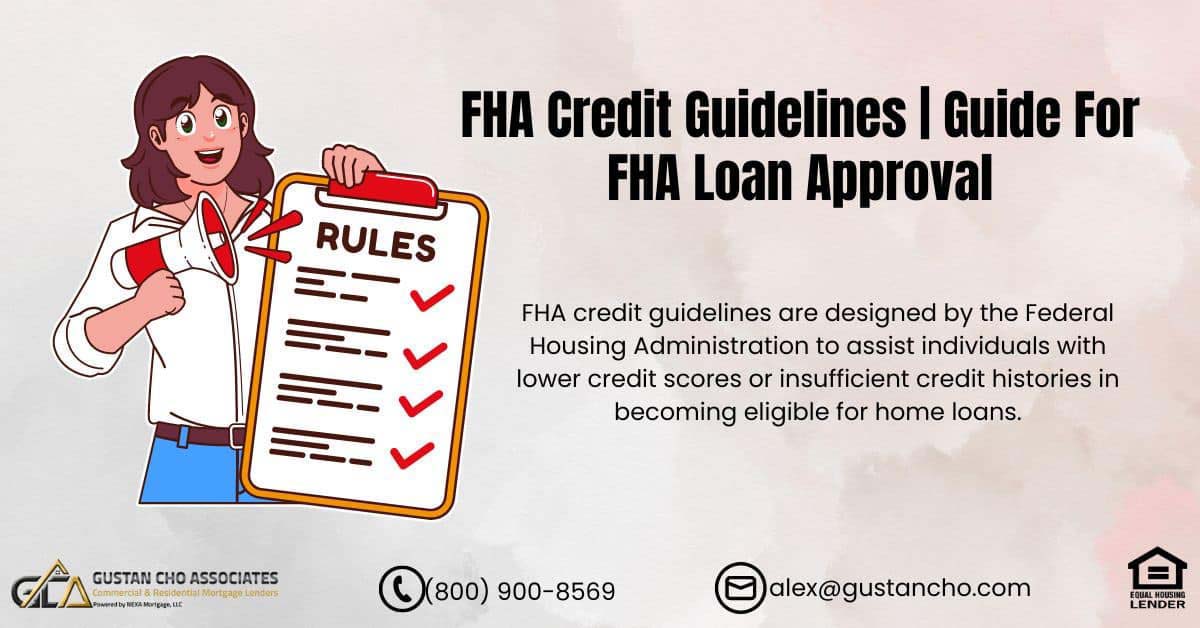In this article, we will discuss and cover the FHA credit guidelines on how to get qualified for an FHA loan.. This will include how to get an approve/eligible per automated underwriting system and what credit guidelines are required on manual underwriting. we will cover the newest updates on recent late payments in the last 12 months. Homebuyers seeking to qualify for FHA loans need to meet FHA credit guidelines. FHA credit guidelines are much more lenient than Fannie Mae and Freddie Mac Guidelines on Conventional loans. Just meeting the minimum credit scores required by FHA does not mean borrowers meet FHA credit guidelines.
FHA Credit Guidelines on Timely Payments on AUS versus Manual Underwriting
Lower credit scores are better than having recent late payments in the past 12 months. It is alright for your to have derogatory credit tradelines with unpaid balances. However, lenders want to see timely payments in the past 12 months. You can get an approve/eligible per AUS with late payments in the past 12 months. Manual underwriting wants 24 months of timely payments. There are many factors involved in meeting the overall FHA Credit Guidelines with regard to the following:
- credit
- credit scores
- credit disputes
- credit payment history
- outstanding collection accounts
- charge off accounts
- judgments
- bankruptcies
- foreclosures
- deed in lieu of foreclosures
- short sales
- tax liens
- late payments
- mortgage late payments
- late payments after bankruptcy
The Federal Housing Administration (FHA) sets guidelines for borrowers seeking loans insured by the FHA. These guidelines are designed to help people with lower credit scores or limited credit histories qualify for home loans. Here are some key FHA credit guidelines. FHA lenders will review your credit history to assess your creditworthiness. They will look for payment history, debts, and credit history.
Turn FHA Credit Rules Into An Actual Approval
Even with past late payments, collections, or low scores, our team knows how to work within FHA credit guidelines to get you to the finish line
HUD Mortgage Insurance Premium Guidelines
HUD, the parent of FHA, mandates that all FHA home loans have mortgage insurance premiums (MIP) to protect the mortgage lender if the borrower defaults. There is an upfront MIP payment at closing, and annual MIP payments are divided into monthly installments.
It’s important to note that while HUD sets these guidelines, individual mortgage lenders may have additional requirements or overlays.
Mortgage borrowers should shop around and compare offers from different HUD-approved lenders to find the best loan terms for their situation. Additionally, FHA guidelines may change over time, so checking with a lender or HUD for the most up-to-date information is essential. In this article, we will discuss and cover FHA Credit Guidelines with recent late payments to be eligible for an FHA loan.
FHA Credit Guidelines on Late Payments Versus Lender’s Own Requirements
Homebuyers with prior bad credit and low credit scores can still qualify for FHA loans. However, they must meet FHA Credit Guidelines. Home Buyers with bad credit also need to meet the mortgage lender’s overlays. Lender overlays are specific additional lending guidelines that a mortgage lender imposes in addition to the minimum FHA Credit Guidelines.
Not Every Lender Has The Same FHA Loan Requirements
Just because you meet FHA Credit Guidelines does not mean you are home free with securing an FHA loan. This is because depending on which lender borrowers go to, they may have additional mortgage lending requirements. Borrowers with bad credit and prior credit issues should consult with a lender who has no overlays, such as Gustan Cho Associates Mortgage. We do not have any mortgage lender overlays. Gustan Cho Associates just goes off the federal minimum lending guidelines on FHA loans, VA loans, USDA loans, and Conventional Loans.
FHA Credit Guidelines on Late Payments After Bankruptcy And Foreclosure
In this section, we will cover bIankruptcy and foreclosure guidelines on FHA home loans. Borrowers who have experienced bankruptcy or foreclosure may still qualify for an FHA loan, but there are waiting periods before they can apply. There is a two-year waiting period after a Chapter 7 bankruptcy discharge date and three years after a housing event.
The Department of Housing and Urban Development (HUD, the parent of FHA) requires a minimum 2-year waiting period after a Chapter 7 Bankruptcy discharge date in order for a borrower to be eligible to qualify for an FHA loan.
There are three types of housing events. A housing event is defined as a foreclosure. Deed-in-lieu, or short sale, to apply for FHA loans. Homebuyers with a prior bankruptcy or foreclosure or short sale must meet minimum waiting period requirements to qualify for an FHA loan.
FHA Credit Guidelines on Active Chapter 13 Payment Term
Homebuyers who have filed a Chapter 13 Bankruptcy can be eligible to qualify for an FHA loan one year into the Chapter 13 Bankruptcy repayment period with the approval of the Chapter 13 Bankruptcy Trustee. 12 months of on-time payments need to be provided and no late payments are allowed in order to qualify for an FHA loan. Homebuyers who had a Chapter 13 Bankruptcy discharge can qualify the day after the Chapter 13 Bankruptcy discharged date.
Stop Wondering, Start Getting Approved
FHA credit guidelines are more flexible than most banks tell you. Let our FHA specialists show you what you really qualify for
FHA Credit Guidelines After Chapter 13 Discharge
There is no waiting period after the Chapter 13 Bankruptcy discharged date. Any FHA mortgage loan applications after Chapter 13 Bankruptcy that has not been two years after the discharge date are all manual underwriting. HUD manual underwriting guidelines apply. FHA credit guidelines on manual underwrites requires verification of rent.
FHA Credit Guidelines For Manual Underwriting
VOR is only valid if the renter can provide 12 months of canceled checks that the renter has paid to the landlord. If the renter is renting their home or apartment from a registered property management company, then a VOR form provided by the lender and completed by the property management company property manager can be used in lieu of canceled checks. There is a three-year waiting period to qualify for an FHA loan after the recorded date of a foreclosure or deed-in-lieu of foreclosure. There is a three-year waiting period after a short sale to qualify for an FHA loan.
FHA Credit Guidelines on Credit Scores Required With Late Payments
Debt-to-Income Ratio (DTI): FHA loans typically require a maximum DTI ratio of 43%, although some lenders may accept higher ratios under certain circumstances. This means your total monthly debt payments (including the mortgage payment) should be at most 43% of your gross monthly income. FHA loans require a minimum of 500 credit scores and a down payment of at least 3.5% of the purchase price.
Minimum Credit Score: While FHA doesn’t have a strict minimum credit score requirement, most lenders will require a to qualify for an FHA loan. Borrowers between 500 and 579 scores must make a larger down payment.
Borrowers with credit scores below 580 FICO and down to 500 credit scores may be required to put down a higher down payment. To qualify for a 3.5% down payment home purchase FHA loan, borrowers need at least a 580 FICO credit score. However, if credit scores are below 620 FICO, then the borrower’s debt-to-income ratios are capped at 43% DTI to get an approve/eligible per AUS. If the borrower has credit scores of 620 or higher, then the debt-to-income ratio caps are capped at 46.9% front-and 56.9% back-end for an AUS Approval.
HUD Guidelines on Outstanding Collection Accounts and Charge-Offs
HUD allows borrowers to qualify for FHA loans with outstanding unpaid collection accounts without having to pay them off. FHA classifies collection accounts into three categories:
- Medical collections
- Charge offs
- Non-medical collection accounts
Bad Credit on Collections and Charged-Off Accounts
Medical collection accounts and charge-off accounts are exempt from debt to income ratio calculations. However, non-medical collection accounts with outstanding unpaid collection balances are counted in debt to income calculations. This holds true even though no monthly payments need to be paid. If the borrower has a total of $2,000 or more in the outstanding non-medical collection account balance, then 5% of the unpaid outstanding collection account balance is counted as a monthly expense. It is counted in debt to income ratio calculations as a hypothetical monthly debt.
FHA Credit Guidelines on Credit Disputes
There are strict FHA Credit Guidelines on credit disputes. Borrowers cannot have any credit disputes on charge-off accounts. Borrowers cannot have any credit disputes on non-medical collection accounts with a total aggregate unpaid collection account balance of $1,000 or greater. Borrowers can have credit disputes on medical collection accounts no matter how large the unpaid outstanding medical collection account balance is.
Exempt From Credit Disputes During Mortgage Process
Borrowers are allowed to have credit disputes on non-medical collection accounts if the collection accounts show zero credit balance. Outstanding collections and charged-off accounts do not have to be paid to get FHA mortgage approval. However, late payments in the past 12 months are an issue. Late payments after bankruptcy and/or foreclosure are often referred to as a second offender. However, the team at Gustan Cho Associates are experts in helping borrowers with late payments after bankruptcy and/or housing event.
FAQ: FHA Credit Guidelines | Guide For FHA Loan Approval
- 1. What are the FHA credit guidelines, and how do they differ from conventional loan guidelines? FHA credit guidelines are designed by the Federal Housing Administration to assist individuals with lower credit scores or insufficient credit histories in becoming eligible for home loans. These guidelines are generally more lenient than Fannie Mae and Freddie Mac guidelines for conventional loans. Meeting the minimum credit score requirement is a must. However, it does not necessarily imply adherence to all FHA credit guidelines.
- 2. How do late payments in the past 12 months affect FHA loan eligibility? Late payments within the last 12 months can impact eligibility for an FHA loan. While automated underwriting systems (AUS) may approve loans with recent late payments, manual underwriting typically requires 24 months of timely payments. Understanding the nuances of timely payments and other credit-related factors outlined in the FHA credit guidelines is essential.
- 3. What role do credit scores play in FHA loan qualification? Lenders might require additional requirements, but FHA loans typically necessitate a credit score of at least 500. People with credit scores between 500 and 579 may have to make a higher down payment, while those with scores of 580 or more can qualify for a 3.5 percent down payment. Lenders may also impose debt-to-income ratio caps based on credit scores.
- 4. What is the waiting period for borrowers with bankruptcy or foreclosure history? A waiting period of two years is required for Chapter 7 bankruptcy, while three years is necessary for housing events like foreclosure or short sale. However, FHA allows borrowers with a Chapter 13 bankruptcy to qualify one year into the repayment period with trustee approval. After Chapter 13 discharge, there is no waiting period.
- 5. Are there specific guidelines for borrowers with Chapter 13 bankruptcy? Borrowers in Chapter 13 bankruptcy can be eligible for an FHA loan after one year into the repayment period, provided they have made on-time payments. After Chapter 13 discharge, there is no waiting period, but manual underwriting guidelines apply, and verification of rent (VOR) may be required.
- 6. How do outstanding collection accounts and charge-offs affect FHA loan qualification? FHA allows borrowers to qualify with outstanding unpaid collection accounts without paying them off. Collection accounts are classified into medical collections, charge-offs, and non-medical collections. Medical collections and charge-offs are exempt from debt-to-income ratio calculations, but outstanding non-medical collection accounts over $2,000 may impact debt calculations.
- 7. What are the FHA guidelines on credit disputes? FHA credit guidelines prohibit credit disputes on charge-off and non-medical collection accounts with a total aggregate unpaid balance of $1,000 or more. However, credit disputes on medical collection accounts are allowed, regardless of the outstanding balance. Borrowers can consult with lenders to understand the specifics of FHA credit guidelines on credit disputes.
- 8. Are all lenders bound by the same FHA loan requirements? No, each lender may have additional requirements or overlays beyond the minimum FHA credit guidelines. Borrowers are encouraged to shop around and compare offers from different HUD-approved lenders. Some lenders, like Gustan Cho Associates Mortgage, operate without overlays, adhering strictly to federal minimum lending guidelines.
- 9. Where can I find the most up-to-date information on FHA guidelines? It is important to remember that FHA guidelines can be updated over time. It is extremely important to ensure the accuracy of the most recent information. This can be done by consulting with a lender or contacting the Department of Housing and Urban Development (HUD) directly. Lenders can provide specific details on their overlays and any additional requirements beyond FHA guidelines.
- 10. How can I get assistance with late payments after bankruptcy or a housing event? If you are a borrower struggling with issues such as late payments following bankruptcy or housing events, it may be beneficial to seek guidance from experts, such as the team at Gustan Cho Associates. Valuable advice and support can be provided to help navigate the credit guidelines of the FHA. They specialize in helping borrowers with unique credit situations and can guide you through the qualification process.
Don’t Let One Bank’s Denial Define You
FHA credit guidelines are more flexible than most lenders’ overlays










